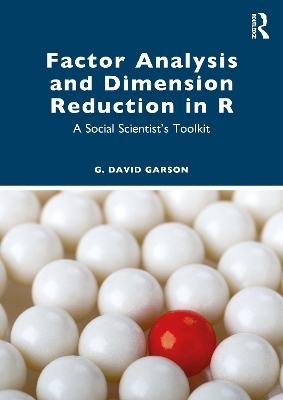
Factor Analysis and Dimension Reduction in R
Routledge (Verlag)
978-1-032-24669-7 (ISBN)
Factor Analysis and Dimension Reduction in R provides coverage, with worked examples, of a large number of dimension reduction procedures along with model performance metrics to compare them. Factor analysis in the form of principal components analysis (PCA) or principal factor analysis (PFA) is familiar to most social scientists. However, what is less familiar is understanding that factor analysis is a subset of the more general statistical family of dimension reduction methods.
The social scientist's toolkit for factor analysis problems can be expanded to include the range of solutions this book presents. In addition to covering FA and PCA with orthogonal and oblique rotation, this book’s coverage includes higher-order factor models, bifactor models, models based on binary and ordinal data, models based on mixed data, generalized low-rank models, cluster analysis with GLRM, models involving supplemental variables or observations, Bayesian factor analysis, regularized factor analysis, testing for unidimensionality, and prediction with factor scores. The second half of the book deals with other procedures for dimension reduction. These include coverage of kernel PCA, factor analysis with multidimensional scaling, locally linear embedding models, Laplacian eigenmaps, diffusion maps, force directed methods, t-distributed stochastic neighbor embedding, independent component analysis (ICA), dimensionality reduction via regression (DRR), non-negative matrix factorization (NNMF), Isomap, Autoencoder, uniform manifold approximation and projection (UMAP) models, neural network models, and longitudinal factor analysis models. In addition, a special chapter covers metrics for comparing model performance.
Features of this book include:
Numerous worked examples with replicable R code
Explicit comprehensive coverage of data assumptions
Adaptation of factor methods to binary, ordinal, and categorical data
Residual and outlier analysis
Visualization of factor results
Final chapters that treat integration of factor analysis with neural network and time series methods
Presented in color with R code and introduction to R and RStudio, this book will be suitable for graduate-level and optional module courses for social scientists, and on quantitative methods and multivariate statistics courses.
PART I: MULTIVARIATE ANALYSIS OF FACTORS AND COMPONENTS
Chapter 1: Factor Analysis: Purposes and Research Questions
Chapter 2: Dealing with the Assumptions and Limitations of Factor Analysis
Chapter 3: Fundamental Concepts and Functions in Factor Analysis
Chapter 4: Quick Start: Principal Axis Factoring (FA) in R
Chapter 5: Quick Start: Confirmatory Factor Analysis in R
Chapter 6. Quick Start: Principal Components Analysis (PCA) in R
Chapter 7: Oblique and Higher Order Factor Models
Chapter 8: Factor Analysis for Binary, Ordinal, and Mixed Data
Chapter 9: FA in Greater Detail
Chapter 10: PCA in Greater Detail
PART II: ADDITIONAL TOOLS FOR DIMENSION REDUCTION
Chapter 11: Sixteen Additional Methods for Dimension Reduction (DimRed)
Chapter 12: Metrics for Comparing and Evaluating Dimension Reduction Models
Chapter 13: Recipes: An Alternative System for Dimension Reduction
Chapter14: Factor Analysis for Neural Models
Chapter 15: Factor Analysis for Time Series Data
APPENDICES
I. Datasets used in this volume
2. Introduction to R and RStudio
| Erscheinungsdatum | 30.11.2022 |
|---|---|
| Zusatzinfo | 1 Tables, black and white; 129 Line drawings, color; 16 Line drawings, black and white; 129 Illustrations, color; 16 Illustrations, black and white |
| Verlagsort | London |
| Sprache | englisch |
| Maße | 174 x 246 mm |
| Gewicht | 1200 g |
| Themenwelt | Geisteswissenschaften ► Psychologie ► Allgemeine Psychologie |
| Mathematik / Informatik ► Mathematik | |
| Sozialwissenschaften ► Soziologie ► Empirische Sozialforschung | |
| ISBN-10 | 1-032-24669-3 / 1032246693 |
| ISBN-13 | 978-1-032-24669-7 / 9781032246697 |
| Zustand | Neuware |
| Haben Sie eine Frage zum Produkt? |
aus dem Bereich


